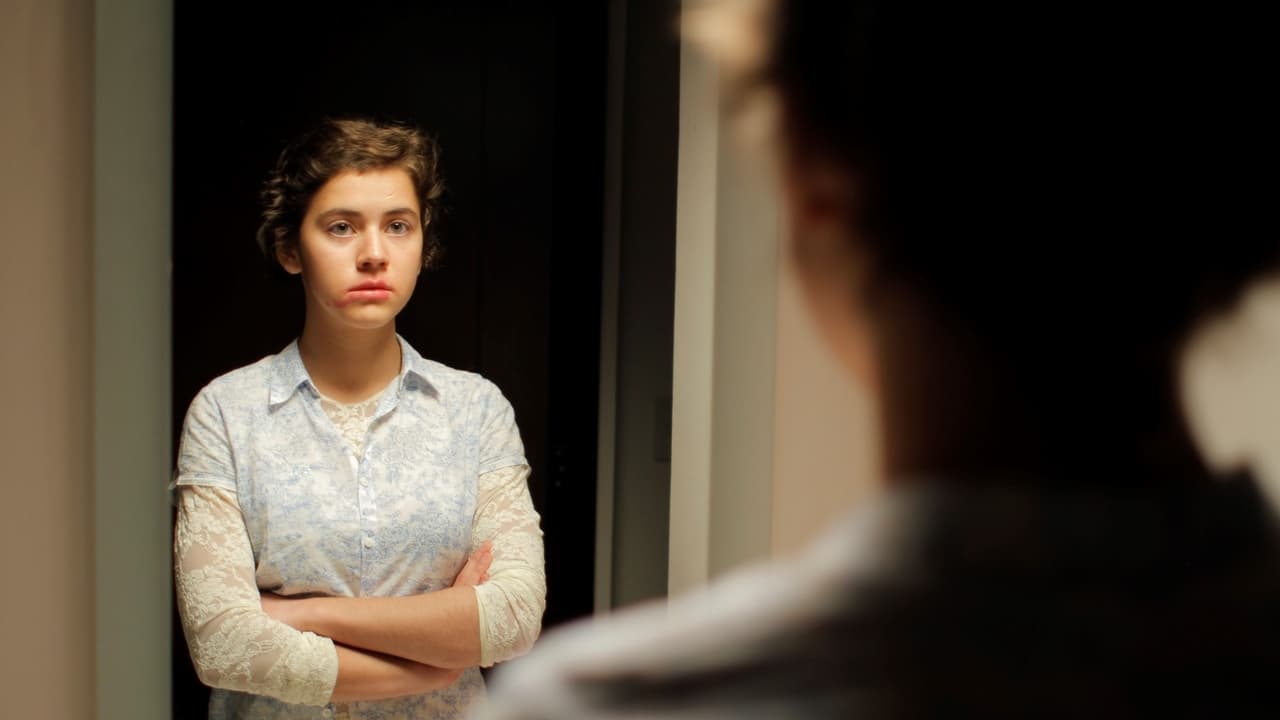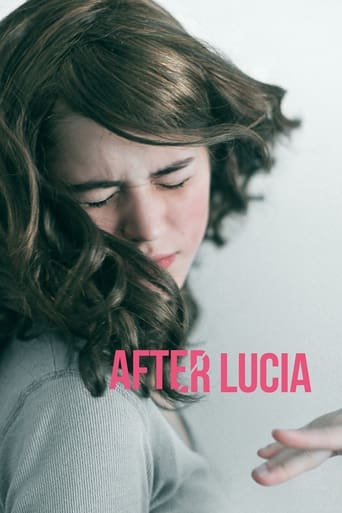

Save your money for something good and enjoyable
... View MoreDreadfully Boring
... View MoreA movie that not only functions as a solid scarefest but a razor-sharp satire.
... View MoreBlistering performances.
... View MoreAfter Lucia is a film of commanding power, which exhibits aesthetical austerity and emotional devastation. This film is disturbing and saddening, not because it's violent or abusive, but because it refuses to show anything but stone cold cruelty, and to show anything less would simply be sheltering the audience from the harsh realities of human nature. The film tracks the plight of two characters, a father (Roberto) and daughter (Alejandra) both grieving the loss of the Titular Lucia, who is killed before the film begins in a car accident. After moving to Mexico City to get a fresh start, Alejandra becomes the victim of bullying at school after a drunken sexual encounter goes viral. The casual harassment gradually escalates to the extreme, but Alejandra refuses to report it in order to shelter her father who is stricken with alienating grief. This film doesn't pull any punches in showing the depth of human casual cruelty buy it never for a second comes off as anything close to sadistic or exploitative. Michel Franco maintains a rigorous and distant aesthetic, with no musical score, almost no camera movements, and holding on shots for extended periods of time. He is careful to show how the bullying Alejandra faces is a product of casual groupthink. Her piers (affluent teenagers whose biggest concerns are cellphones and fashion) submit her to increasingly inhumane suffering as casually as they welcome her into the school initially. Franco is attempting to emphasize both how middle class sheltering gives leeway into the diminishing humanity, and how the emotional vulnerability of youth makes this behavior blossom. After Lucia isn't an enjoyable film by any means but its certainly an affecting one, which will permeate its viewers subconscious long after an initial viewing.
... View MoreA well made film, technically, but I found the story unbelievable. Alejandra is a new girl in a Mexican school, still grieving for her recently deceased mother. She soon makes the serious mistake of having sex with a handsome boy, who videos the event, with her knowledge, and then, without her knowledge, causes the video to be sent round the school. Charming!.Thereafter the bullying is ceaseless. My complaint is this: what no other reviewer, I think, has pointed out is that in all this class of school children and their horrifically escalating violence towards the meekly submitting Alejandra, not one of them shows for one moment any decent human feeling for the girl. Some reviewers tell us that this sort of wholesale 'everyone against one child' bullying happens all the time. I don't believe it.The ironic ending is powerful (suitable for a Greek tragedy), but not original.
... View MoreIt's hard to watch Después de Lucía and don't get hit by a mix of feelings caused by it, like anguish, guilt, hatred and pity. And these are just a few that I felt when watching the movie. At least for me, the movie was pretty effective, mainly because I have witnessed situations just like the one shown in the movie.The story follows the teenager Alejandra and her father Roberto moving to a new city after the death of the title character. In this new town, he starts working as a chef while Alejandra starts going to school. After something happens in a weekend party, she starts being bullied by the students.Everything that her character goes through makes us feel really bad and powerless, seeing all that and without the capacity to help. And that's part of the superb direction of Michel Franco, which really carries the movie. Notice that almost all scenes have a static camera, and all the action perfectly fits within the frame. This gives us powerful scenes, like the one in the trip to Veracruz, where we can see students making out, others smoking marijuana, others drinking and two guys talking about something that one of them just made in the bathroom. Even with all this happening on the screen, we can't stop thinking about what happened outside of it, and it's hard to tell what just happened in that bathroom.The camera is always far from the actors, trying to avoid us to make a connection with them. However, there is one scene with a close-up in Alejandra face, maybe to make us feel close to her. There is also only one scene (that I remember) where the camera moves, and that happens when Alejandra enters the classroom, and we see a 180 degree turn, maybe in an attempt of Franco to tell the public that the moment when the girl enters that room, her life is going to take a similar turn.The director also made a good choice picking Tessa Ia e Hernán Mendoza for the main roles. When they're together, it's visible the indifference that reigns in their relationship. Roberto always tries to hide his suffering from Alejandra but when he is alone he cries and can't stand to drive the car in which his wife died. And even trying to show some love for Alejandra, he fails in some situations, like the one when he forgets her birthday, a fact that is not missed by her so called friends.If it wasn't for the ending, which will irritate the politically correct, I wouldn't hesitate in show Después de Lucía to some students, trying to make them to see the dimension that bullying can reach. And let's make clear that I'm not a defender of Alejandra, mainly because the act that starts all of the bullying is caused by her recklessness. But, even knowing that she has some guilty in everything that happened, the reaction it caused was extremely unproportional.
... View MoreI saw this film at the Ghent filmfestival 2012. A chef (Roberto) and his daughter (Alejandra) move to a city where both are new. Their wife resp. mother has recently died in a car accident, and their move seems a recipe to get some distance from what happened and an attempt to deal with their loss. Father and daughter follow their own path to get settled in their new environment.We see Roberto starting to work in a restaurant, but his depressive mood and sudden impatience hinders him from a fruitful working relationship with co-workers. He quits suddenly, but that solved nothing and he regrets this hasty decision. We see him later on working as a chef again. But the remembrance of his loss continues to haunt him. His depressions and anger are never taken out on his daughter, however.Alejandra seems to get along well with her new classmates, and integrates remarkably fast. That turns around when a film showing her being drunk and having sex during a party, happens to be published on Internet. That triggers an unbelievable amount of bullying by her classmates, often to such an extent that you eagerly want to look away. But you can't, while the camera is close by and does not let go.It is difficult to believe that the young players are all amateurs with no previous experience on stage or film-set. They have a significant part in the proceedings, be it the collective bullying of Alejandra, or the collective silence when interrogated by teachers about what is going on. The boys and the girls play equal roles in the bullying. I see them showing a very natural way of behaving, even with the camera very close.The collective mindset, all against one, is not easy to watch. Teachers nor parent have any idea that worrisome things are going on. You feel alone with Alejandra. With apparently no one to rescue her, it is all very disturbing to witness. Teachers are not aware, because these school kids are too old to need constant supervision, and have a lot of leeway to fill their own time. The parent (Roberto) is not aware that anything bad is happening with Alejandra. As a loving daughter she takes all trouble to shield her father from any bad news, observing his depressive moods. Not until very very late in the story we see involvement of teachers and parent.A few loose ends remain unexplained, maybe only to show Roberto's depressive mood and nothing else. Best example is that in the beginning of the film we see that he let a garage fully restore his wife's car after a crash, to subsequently abandon it somewhere with the keys inside to continue his journey on foot. Halfway the film we see the same car wrecked again after a disastrous joy riding. Similar inconsistencies I have with Roberto's job at a the restaurant where he works at first, then quits, and later on resumed working without much explanation. All things considered, these are minor details.The camera closes in on the story. The situation gets from bad to ugly, and without anyone on the rescue. I consider this a very strong feature of this film, letting us watch what happens from very close. You get involved, willingly or not. I scored a 5 (out of 5) for the audience award when leaving the theater. In hindsight, though not as bad as Alejandra, I feel a bit lonely too when seeing that this film ended on the 38th place for the audience award, in my opinion undeservedly surpassed by several films with much less qualities.
... View More